But
the great myth of the current cycle is the misguided notion
that the hopes and dreams of activists represent the heart
and soul of the Democratic Party. Real Democrats are real
people, not activist elites. The mission of the Democratic
Party, as Bill Clinton pledged in 1992, is to provide
"real answers to the real problems of real people."
Real Democrats who champion the mainstream values, national
pride, and economic aspirations of middle-class and working
people are the real soul of the Democratic Party, not
activists and interest groups with narrow agendas.
Republicans
have nothing on the DLC when it comes to slinging code words.
In truth, this "rump faction" has no soul. It's
just a big, white corporate pocket. The only masses that count
for the DLC are massed dead presidents, stacked high. The
From-Reed crowd operates on a cash for favors basis, only.
When a corporate deal is brokered for hungry Democrats, the
DLC considers the agreement binding, on pain of later impoverishment.

Dreyfuss
laid out the "New Democratic Network" fund-raising
process in his American Prospect piece, "How
the DLC Does It."
NDN's
brochures sound like investment prospectuses. "NDN
acts as a political venture capital fund to create a new
generation of elected officials," says the PAC. "NDN
provides the political intelligence you need to make well-informed
decisions on how to spend your political capital. Just like
an investment advisor, NDN exhaustively vets candidates
and endorses only those who meet our narrowly defined criteria
..."
To
ensure that liberals don't slip through the cracks, NDN
requires each politician who seeks entree to its largesse
and contacts to fill out a questionnaire that asks his or
her views on trade, economics, education, welfare reform,
and other issues. The questions are detailed, forcing candidates
to state clearly whether or not they support views associated
with the New Democrat Coalition, and it concludes by asking,
"Will you join the NDC when you come to Congress?"
Next, [the DLC] interviews each candidate, and then NDN
determines which candidacies are viable before providing
financial support.
It
is a textbook model of 21st Century political accountability
- not to voters, but to corporations that spend most of their
dollars with Republicans. The DLC is, at root, a candidate
shakeout mechanism for big business, a clearinghouse for betrayal.
Candidates must agree to support the "narrowly defined
criteria" of the boardrooms, rather than the needs and
aspirations of their constituencies. Every candidate that
embraces the DLC has signed off on very specific points of
the corporate agenda - a kind of political receipt for services
rendered.
Democratic
elected officials and candidates from Congress to city council
and in practically every state of the union complete detailed
questionnaires probing their views on war and peace, on criminal
justice, on trade, tax policy and corporate welfare. Their
answers are funneled to the national organization where they
are meticulously examined. The Democratic incumbents and hopefuls
that pass muster are called in for personal interviews by
senior staff. Democrats who clear the rigorous screening process
are highly recommended to the organization's corporate constituents
as worthy of their wholehearted and generous support.
A
purely corporate edifice
The
DLC doesn't represent any Democratic Party voters.
Its masters include American and United Airlines, Aetna and
New York Life Insurance, Microsoft, DuPont, the agribusiness
and pharmaceutical industries, Citigroup and, until recently,
Enron, among many others. The DLC is an organization conceived
in the boardroom and dedicated to the proposition that moneyed
interests trump all others. About two hundred corporations
comprise its Board of Advisors (fee: $5,000), and nearly 100
pay the cost to be the boss on the DLC's Policy Roundtable
($10,000 each). For $25,000, around 30 corporate executives
pretend to be Democrats as members of the DLC Executive Council.
Enron sat there, along with Philip Morris, Texaco, Chevron,
and Dupont.
The
Democratic Leadership Council is the mother of all corporate
Trojan horses, and despite its incompetence at persuading
Democratic voters to come to the polls it has come to dominate
today's Democratic Party. These "New Democrats"
bring their corporate assets to Philadelphia, July 19, for
what they call a "National Conversation" - one in
which money does all the talking. Look around for the black
faces - they're under contract or, as DLC founder Al
From puts it, "on display":
The
National Conversation is the premier event for New Democratic
elected officials from around the country, where rising
political stars gather to hear from leading national voices
and discuss the ideas and strategies that will shape the
country's future. It is always a great testimonial to the
strength, depth, and vitality of the New Democrat movement.
Democrats who run, win, and govern in every region of the
country, including many swing states and red states, will
be on display here.
DLC
boss From expects about 300 "New Democrat" elected
officials to show up in Philadelphia. That's about the same
as the number of corporations represented in the national
DLC, whose "ideas and strategies" the elected officials
have signed on to serve. Theoretically, each elected "New
Democrat" can buddy up with a corporate executive in
Philadelphia, to carry on their own "national conversation"
free from meddling by actual voters and, in Al From's words,
"the narrow concerns of interest groups and activists
so visible in party caucuses."
Whistling
Dixie on the way to the bank
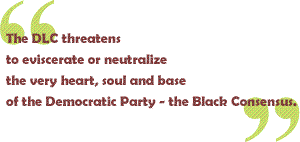 The
DLC is the corporate-funded right wing of the Democratic Party.
It was founded in the mid 1980s by a small group of mostly
white, male, largely southern Democratic politicians, corporate
lobbyists and fundraisers. The original clique included Tennessee
Congressman Al Gore, Senators Chuck Robb of Virginia and Sam
Nunn of Georgia, and Al From, a former political operative
from the Jimmy Carter Administration. To them, the Democratic
Party had become too open to the political voices of African
Americans and Latinos, too respectful of the rights of working
Americans and the labor movement, too responsive to the justice,
peace and environmental movements. "The DLC thundered
against the 'liberal fundamentalism' of the party's base -
unionists, blacks, feminists, Greens, and cause groups generally,"
wrote Dreyfuss.
The
DLC is the corporate-funded right wing of the Democratic Party.
It was founded in the mid 1980s by a small group of mostly
white, male, largely southern Democratic politicians, corporate
lobbyists and fundraisers. The original clique included Tennessee
Congressman Al Gore, Senators Chuck Robb of Virginia and Sam
Nunn of Georgia, and Al From, a former political operative
from the Jimmy Carter Administration. To them, the Democratic
Party had become too open to the political voices of African
Americans and Latinos, too respectful of the rights of working
Americans and the labor movement, too responsive to the justice,
peace and environmental movements. "The DLC thundered
against the 'liberal fundamentalism' of the party's base -
unionists, blacks, feminists, Greens, and cause groups generally,"
wrote Dreyfuss.
Most
alarming of all, in their eyes, was the 1984 presidential
campaign of Jesse Jackson, in which the black candidate received
a percentage of the vote considerably higher than the proportion
of black votes in several states, and sparked a significant
expansion of the party's base constituencies among minorities,
labor, and even some white rural voters. The Democratic Party
was actually growing - but in the wrong direction to
suit the "rump faction" centered in the white South.
Today,
after almost two decades of DLC cash subversion and seduction
of Democratic candidates and office holders, there is less
difference than ever between Democrats and Republicans in
state houses and legislatures, in City Halls or on the bench,
in Congress or among the so-called "serious" candidates
for president. Once again, actual and potential Democratic
voters have been deterred from entering a political process
that does not address their needs. For its next triumph, the
DLC threatens to eviscerate or neutralize the very heart,
soul and base of the Democratic Party - the Black Consensus.
Polluting
the "base"
The
hustlers that founded the DLC noted that vast amounts of corporate
money were flowing into the state and national bank accounts
of the Reagan-era Republican Party. To qualify for a cut of
that largesse for themselves they would have to hijack the
Democratic Party and move it to the right, away from its Democratic
voting base.
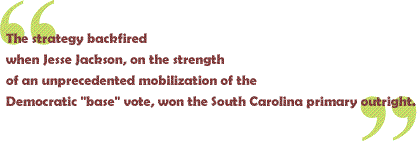
The
clique's objectives were (a) to move the Democratic Party
to the right in order to attract contributions from the oil
and insurance industries, from Wall Street and military contractors
and whoever else could write the big checks, and (b) to tailor
the Democratic Party's pitch to attract upwardly mobile conservative
white and suburban "swing" voters.
Bill
Clinton, the ambitious young governor of Arkansas, was an
early DLC star recruit, and Al Gore was its anointed presidential
candidate in 1988. Super Tuesday, a multi-state mega-primary
centered in the former Confederate states, was engineered
by the DLC/New Democrats to be their first electoral coup.
By concentrating the weight of the South, Super Tuesday was
designed to preemptively narrow the range of choices available
to Democratic voters nationwide early in the presidential
nominee selection process. It was also deliberately intended
to swing the advantage to the candidate who could spend big
bucks on simultaneous media campaigns in several states. However,
the strategy backfired when Jesse Jackson, on the strength
of an unprecedented mobilization of the Democratic "base"
vote, won the South Carolina primary outright.
Funded
by an impressive array of corporate backers, the DLC/New Democrats
founded their own think tank, the elegantly misnamed Progressive
Policy Institute, and ground out reams of press releases,
corporate-friendly position papers, consultant referrals,
in-person and on-air advice to Democrats that they'd better
become more like Republicans if they wanted to remain "competitive"
- an invitation to make themselves fitting recipients for
corporate bribes, a.k.a. big campaign contributions.
The
insurgent DLC tinkered with the delegate selection process
at Democratic conventions to frustrate the participation of
grassroots party activists. They developed their rightist
corporate message and they stayed on it. They built an impressive
machine to boost each other's careers and publicize the alleged
"new ideas" and "innovative approaches"
of their star politicians. Connecticut Senator Joe Lieberman,
Missouri Congressman Dick Gephardt and Bill Clinton all served
as DLC chairs. Jimmy Carter was involved, as was every southern
Democratic governor.
The
DLC in the White House
Clinton
was the DLC/New Democrat candidate in 1992. Rather than answer
the Reaganite myth of the welfare queen, Clinton pandered
to it and gave us a "welfare reform" more punitive
than anything Reagan-era Republicans could have wrested from
the Congress. Following the advice of his DLC advisors to
not appear too close to his party's base - which 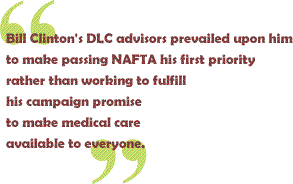 had
nowhere else to go, anyway - New Democrat Clinton took a couple
days off during the campaign to fly back to Arkansas and pull
the switch on a mentally impaired black convict, and attended
an Operation PUSH event specifically to upbraid young black
activist Sista Souljah. Once in office, it was Bill Clinton's
DLC advisors who prevailed upon him to make passing NAFTA
his first priority rather than working to fulfill his campaign
promise to make medical care available to everyone. So it
was that during his first two years as president, the only
years during which Democrats controlled the Congress, Bill
Clinton called in all his chips to get DLC/New Democrats in
Congress to vote against the majority of their party caucus
and join with the Republican minority to pass NAFTA, directly
causing the loss of millions of US jobs to low-wage labor
markets elsewhere in the hemisphere.
had
nowhere else to go, anyway - New Democrat Clinton took a couple
days off during the campaign to fly back to Arkansas and pull
the switch on a mentally impaired black convict, and attended
an Operation PUSH event specifically to upbraid young black
activist Sista Souljah. Once in office, it was Bill Clinton's
DLC advisors who prevailed upon him to make passing NAFTA
his first priority rather than working to fulfill his campaign
promise to make medical care available to everyone. So it
was that during his first two years as president, the only
years during which Democrats controlled the Congress, Bill
Clinton called in all his chips to get DLC/New Democrats in
Congress to vote against the majority of their party caucus
and join with the Republican minority to pass NAFTA, directly
causing the loss of millions of US jobs to low-wage labor
markets elsewhere in the hemisphere.
By
2000 the DLC/New Democrats were firmly in control of the Democratic
convention, as well as the process of selecting delegates
and the party's nominees - their old retread from the 80s,
Al Gore, and a piously pandering senator and former DLC chairman
from Connecticut, Joe Lieberman. DLC/New Democrats at the
convention used any means necessary to shut down the "national
conversation" that hundreds of grassroots delegates wanted
to take up. John Nichols provided a valuable account in the
September 2000 issue of The Progressive, "Behind
the DLC Takeover."
"'We
have all these progressive Democrats here ready to fight
on issues of economic and social justice, Democrats who
know these are the winning issues and who know that when
we fail to run on them we lose," said Representative
Jesse Jackson Jr., Democrat of Illinois. "But, in the
leadership positions of the party, we have the DLC trying
to pull us in an entirely different direction."
Minnesota
Senator Paul Wellstone echoed Jackson's view. "There
are forces within the Democratic Party who want us to sound
like kinder, gentler Republicans," he said. "I
want us to compete for that great mass of voters that want
a party that will stand up for working Americans, family
farmers, and people who haven't felt the benefits of the
economic upturn."
The
DLC is trying to run the same game in 2004.
The
DLC and Black Trojan Horses
Back
in  's
second issue (May
8 2002) Harvard's Dr. Martin Kilson coined the term "Black
Trojan Horse" to describe the stealth candidacy of one
Cory Booker for mayor of Newark, New Jersey. The Booker campaign
was a joint project of the DLC and the most right-wing foundations
and think tanks in the nation. (See "Fruit
of the Poisoned Tree," April 5 2002.) Although revelations
of Booker's far-right associations caused him to lose his
bid to plant the school vouchers flag in a major black city,
the DLC continues to bestow its corporate seal of approval
on a steady trickle of black officeholders and candidates.
A new class of trophy blacks will walk the corporate runway
in Philadelphia, next month.
's
second issue (May
8 2002) Harvard's Dr. Martin Kilson coined the term "Black
Trojan Horse" to describe the stealth candidacy of one
Cory Booker for mayor of Newark, New Jersey. The Booker campaign
was a joint project of the DLC and the most right-wing foundations
and think tanks in the nation. (See "Fruit
of the Poisoned Tree," April 5 2002.) Although revelations
of Booker's far-right associations caused him to lose his
bid to plant the school vouchers flag in a major black city,
the DLC continues to bestow its corporate seal of approval
on a steady trickle of black officeholders and candidates.
A new class of trophy blacks will walk the corporate runway
in Philadelphia, next month.
We
laid out  's
position on so-called New Democrats in our September 19 Trojan
Horse Watch article.
's
position on so-called New Democrats in our September 19 Trojan
Horse Watch article.
Every
African American politician associated with the DLC should
be considered suspect, and closely watched. There is no
reason for them to be there except to make deals with the
party's right wing - which believes that Gore lost the 2000
election largely because he became too closely identified
with blacks and labor.
For
the Right, bankrolling black Trojan Horses who can masquerade
as Democrats while pushing positions well to the right of
most other African Americans and the rest of the Democratic
party's base has distinct advantages over feeding and watering
the old stable of token black Republicans like former Congressman
J.C. Watts. Black Republicans are rarely electable to significant
office outside overwhelmingly white constituencies, making
it difficult for the Right to maintain the pretense that these
craven stooges represent black public opinion, or anything
beyond their own career ambitions. It should come as no surprise
that black Republicans are a hard sell among black voters,
since a large part of their credentials consists of ostentatious
display of "courageous independence" from and opposition
to the views of the vast majority of the African American
community.
By
contrast, the employment of black Trojan horse Democrats opens
up new opportunities for the Right. It is in fact cheaper
and easier for the corporate Right to flip an incumbent black
Democratic city councilman, state legislator or congressman
than it is to bring up stooges through its own farm system.
Given the choice, the Right would rather buy a black, than
groom one.
A
new crop of "black leaders" - appointed, anointed
and financed by corporate cash - is being foisted on the community,
some of them old faces transformed by new infusions of capital.
An ominous and confusing period is upon us as these newly
minted or recently transformed black elected spokespeople
are trotted out by the corporate media as evidence that the
Black Consensus no longer exists, that African Americans have
shed our "outmoded" habit of groupthink everywhere
that it differs from the purported White Consensus.
Breaking
up the bloc
For
more than two generations the vast majority of African Americans
have cast ballots for Democrats, comprising that party's most
loyal constituency. The black bloc vote phenomenon is the
electoral expression of what we call the Black Consensus,
in which African Americans support in overwhelming numbers
whichever candidate they perceive to be closest to their commonly
held views on public education, full employment, war and peace,
criminal justice, fairness and other issues.
The
black American tendency to vote more or less as a community
is what made possible the careers of generations of African
American Democratic (and if you go back far enough, Republican)
operatives and politicians. More importantly, black bloc voting
is the only factor that keeps the legitimate demands of African
Americans alive and visible in the nation's political discourse.
Breaking
up the black bloc vote and thereby blunting the electoral
impact of the Black Consensus has long been the cherished
goal of the bipartisan Right. White pundits are forever scolding
black America for our misguided "monolithic" behavior
at the polls, duplicitously complaining that it isolates rather
than empowers black communities. Each election cycle, they
wistfully predict that black bloc voting is about to end.
Soon a new crop of corporate funded black candidates and elected
officials, many originally elevated to office on the strength
of the Black Consensus itself, will be available to tell white
America what it wants to hear, that the consensus is irrelevant
or no longer exists.
Philly
follies and minstrelsy
If
the DLC's
roster is any guide, we can expect a modest herd of actual
and aspiring black Trojan Horses to converge on Philadelphia,
July 19, ready and willing to adjust their views on war and
peace, criminal justice or anything else on the agendas of
the wealthy campaign contributors gathered there to meet them.
A significant number will be incumbent black elected officials.
Just
what do black elected officials get from affiliating with
the DLC/New Democrats?
They
don't get "new ideas." Memphis Rep. Harold Ford
doesn't have any ideas, other than to pledge allegiance to
the Bush war policy. Georgia Rep. Denise Majette has none,
and Cory Booker is just a shill for private school vouchers.
They are essentially empty suits.
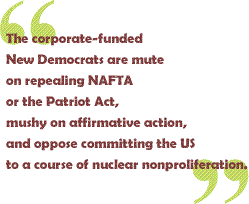 A
look through the DLC/New Democrats' online "Congressional
Idea Book" and State and Local Playbook reveals little
that is new and even less that is of interest to what the
late Minnesota Senator Paul Wellstone used to call the "Democratic
wing of the Democratic Party". The DLC/New Democrats
have nothing to say about full employment, or raising the
minimum wage, or about making health care available to everyone.
Instead, they package as "new" and "progressive"
the craven and ridiculous suggestion of presidential candidate
Joe Lieberman that the national focus should be on curing
chronic diseases rather than extending health care to everyone.
National health insurance is dismissed as "big government."
A
look through the DLC/New Democrats' online "Congressional
Idea Book" and State and Local Playbook reveals little
that is new and even less that is of interest to what the
late Minnesota Senator Paul Wellstone used to call the "Democratic
wing of the Democratic Party". The DLC/New Democrats
have nothing to say about full employment, or raising the
minimum wage, or about making health care available to everyone.
Instead, they package as "new" and "progressive"
the craven and ridiculous suggestion of presidential candidate
Joe Lieberman that the national focus should be on curing
chronic diseases rather than extending health care to everyone.
National health insurance is dismissed as "big government."
The
corporate-funded New Democrats are mute on repealing NAFTA
or the Patriot Act, mushy on affirmative action, and oppose
committing the US to a course of nuclear nonproliferation.
Aside from a reference to anti-profiling measures, there is
little that addresses the needs of working Americans, of minorities,
or that holds corporations accountable for their misconduct,
or about financing elections with public funds to break the
hold of big money contributors on the political processes.
Another
representative sample of New Democrat "new ideas"
is The May 30, 2003 New Dem "Idea of the Week" -
charter schools for military dependents, which will somehow
benefit public school students in nearby communities by injecting
"choice and competition" into the mix. What it will
actually do is further contribute to the increasing separation
and isolation of the military and their families as a separate
class from the rest of civil society, and further defund and
degrade the public schools that children of non-military families
near the base must attend.
To
supplement its bad policy advice, the DLC offers exceptionally
bad campaign advice to African American and other candidates
and officeholders, and expensive consultants to dispense it.
Although the electorate as a percentage of eligible voters
has been shrinking for decades, the enlightened wisdom of
DLC operatives, which has become the conventional wisdom of
Democratic political consultants, is not to bother enlarging
the pool of eligible and interested voters. DLC advisors counsel
clients to run to the "center," a target that is
itself constantly shifting rightward, to tailor their appeal
to an ever-smaller group of Republican-leaning swing voters,
and to do it with large expenditures on big media and direct
mail to targeted constituencies. A couple of 2002's DLC non-success
stories include Ron Kirk of Texas among black candidates,
and Roy Barnes, the former governor of Georgia - another rising
DLC star until he lost last year despite outspending his Republican
rival about five to one.
What
African American politicians and candidates do get from DLC
affiliation is "access" - access to the money they
need to pay for the bad advice. Access to money to pay for
TV time. Access to the funding to retire old campaign debts
and be re-elected. Before the days of the DLC it was said
that corporate interests gave politicians money so they could
get "access" to powerful politicians. But the DLC/New
Democrats have effectively subordinated the crafting of public
policy to the quest for campaign contributions. The old relationship
has been reversed. Black politicians seek campaign donations
to be viable candidates, and are thus "free" to
adjust their stands on issues in the direction that keeps
those contributions flowing. The DLC and its corporations
have purchased the political discourse.
So
it is that this mother of all political Trojan Horses, the
DLC, has seized institutional control of the Democratic Party
and will not be dislodged easily, if at all.

One
saving grace remains. Although corporations can buy politicians
by the bushel, they cannot vote. The logical answer to corporate
dominance of the electoral process then, is to remove corporate
money. Real campaign finance reform would outlaw contributions
from corporations and big donations of wealthy individuals.
Once corporations are deprived of the ability to bribe politicians,
the Democratic Party will belong to its base among Democratic
voters. There are formidable barriers to reform of this kind,
including Supreme Court decisions that very nearly equate
corporate bribes to politicians with First Amendment-protected
"free speech." Campaign finance reforms must also
be legislated upon by the very state and federal lawmakers
elected under the current system. As Rep. Jesse L. Jackson
Jr. (D-Chicago) put it:
The
American people recognize that money - unregulated and even
regulated money - presently keeps our House, our Senate,
and our Presidency from creating an equal, high-quality
education for our children, or from providing all Americans
with equal, high-quality health care. The American people
believe campaign money prevents them from having a clean,
safe, and sustainable environment. Instead of real reform,
we get politicians - Democrats and Republicans - voting
to raise the limits on campaign contributions to "adjust
for inflation." I just don't know many people in the
Second District of Illinois who are clamoring to be able
to give $3,000 each election cycle to their Congressman.
I think they are more interested in adjusting the minimum
wage upward - but Congress isn't debating that.
And
what if corporate money cannot be removed from the process
any time soon? The time may be near when the Black Consensus
and other parts of the Democratic Party's historic legacy
will have to find temporary or permanent homes elsewhere.
In 1948 the Progressive Party presidential campaign of Henry
Wallace, in which Paul Robeson played an important part, posed
a significant enough threat to Democrat Harry Truman's chances
that he was forced to move to the left to keep that Democratic
base largely intact. This was why in the weeks before the
election Truman found the spine to veto the infamously anti-labor
Taft-Hartley bill and desegregate the armed forces by presidential
decree. Without a high-profile Progressive Party presidential
campaign in 1948 the US armed forces might not have begun
desegregation until the mid-1950s or later. Though legal barriers
to ballot access are higher than two generations ago, and
access to coverage in the corporate-owned media harder to
come by than ever, this is another avenue that may have to
be explored.
Meanwhile,
 recommends that readers interested in identifying the corporate-funded
black Trojan Horses among their Democratic elected officials
peruse the DLC/New Democrat online directory of local elected
officials and its "100 Democrats to Watch" page.
There will be a lot of watching and some calling to accounts
in the near future. In the words of Rep. Jackson, again:
recommends that readers interested in identifying the corporate-funded
black Trojan Horses among their Democratic elected officials
peruse the DLC/New Democrat online directory of local elected
officials and its "100 Democrats to Watch" page.
There will be a lot of watching and some calling to accounts
in the near future. In the words of Rep. Jackson, again:
In
order for progressives to be effective, we must resist being
a wholly owned subsidiary of the Democratic Party. We must
be equal opportunity challengers of Democrats who violate
our fundamental principles ... "
Maybe
the last time
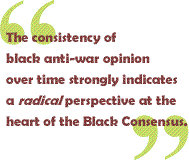 Fifteen-hundred
activists showed up in Washington last week to rally under
the banner, "Take Back America," but the real agenda
was to take the Democratic Party back from the DLC. Although
conference turnout was triple that of last year, progressives
remain on the defensive, largely ignored by corporate media
and relentless reviled by the now-entrenched DLC. As organizer
Robert Borosage told the Washington
Post, "They want to read the peace movement out of
the party. That's goofy politics .... The base of the Democratic
Party is here."
Fifteen-hundred
activists showed up in Washington last week to rally under
the banner, "Take Back America," but the real agenda
was to take the Democratic Party back from the DLC. Although
conference turnout was triple that of last year, progressives
remain on the defensive, largely ignored by corporate media
and relentless reviled by the now-entrenched DLC. As organizer
Robert Borosage told the Washington
Post, "They want to read the peace movement out of
the party. That's goofy politics .... The base of the Democratic
Party is here."
The
DLC also seeks to purge the Black Consensus from black electoral
politics, a consensus that is overwhelmingly for peace. As
 wrote in a November
21 analysis:
wrote in a November
21 analysis:
The
black political dialogue occurs almost entirely on the Left,
the space where the Black Consensus is formed.
The
JCPES poll confirms that only one out of five African Americans
(19.2%) support this government's war preparations. The
finding is consistent with black political opinion as measured
over the decades since the Vietnam War. Anti-war opinion
is a core element of the Black Consensus, unbroken over
two generations and indicating a much deeper distrust of
the motives of those in power ....
In
every practical sense, this measurement places the bulk
of African Americans firmly on the left side of the American
political spectrum. Indeed, the consistency of black anti-war
opinion over time strongly indicates a radical perspective
at the heart of the Black Consensus.
The
Black Consensus is also a "big government" agenda,
requiring big solutions to big problems bequeathed by monstrous
racism.
Ralph
Neas, President of People for the American Way, seemed confident
that the DLC can be beaten back this primary cycle. "We've
been preparing a long time for this," said Neas to the
Hartford
Courant, "and we are going to block any right-wing
nominee."
The
right-wing nominee's name is Joe Lieberman. If he wins the
nomination, it will be time to head for the exits of the national
Democratic Party.


